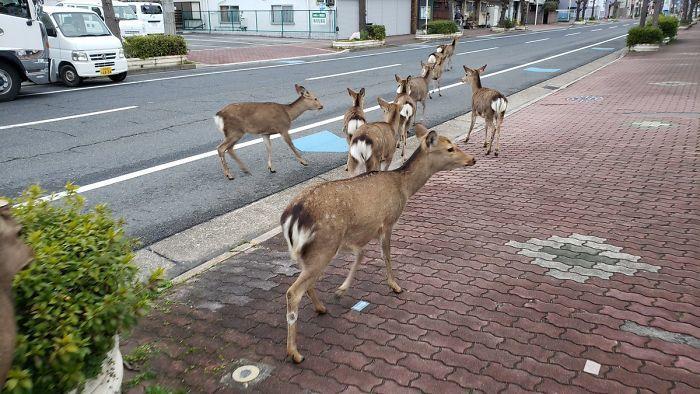Over the course of the last interminable month, a few nuggets of good news have shone from the heap of bad news. Namely, videos from across the globe have shown animals reclaiming dormant cities.
In Italy, fish and dolphins are swimming through the crystal-clear canals of Venice, and in Wales, mountain goats are grazing in empty village squares. As millions like and retweet these heartwarming posts, the common refrain has become “humans are the problem.”
As is often the case on the internet, this phrase spread quickly and sparked debate. Most people took the “humans are the problem” idea as an innocuous jab at our wasteful living habits, but others have taken it much farther.
For some eco-fascists, who believe that a forceful authoritarian government is the key to reversing global warming, these animal videos are indications that only great restrictions of human liberties, and optimally, large reductions in population, will preserve our planet’s health.
Not too surprisingly, promoting the deaths of millions via a respiratory virus is a controversial stance. Just because a reduction in our world population would, theoretically, be advantageous in combating climate change does not mean that we should let the virus run rampant and deny care to the sick. We still hold a moral obligation to put empathy first and care for each other.
Similarly, just because a stricter control of human movement and freedoms may reduce waste and carbon emissions, it doesn’t mean human rights should be infringed upon. The human experience is interwoven with our planet’s survival, and neither should be sacrificed for the benefit of the other.
If anything, the animal videos show us that it is possible for all the humans currently alive on Earth to live harmoniously with nature. Humans are not the problem; human habits are the issue. The question remains, however, of how to maintain the ecological progress we’ve made once life returns to normal.
People obviously can not continue living in isolation for the remainder of human history, but some defining features of this era of quarantine can be adapted to regular life. Should more meetings, especially ones that require international travel, be moved online? Should people be incentivized to go to restaurants and venues closer to their homes? Should public transportation be increased to reduce individual car traffic?
I fear that once the pandemic abates people will be so eager to return to their daily schedules that there will be no moment for reflection on what isolation has meant to us. We are living in an unprecedented opportunity for environmental change, change that can be implemented effectively without the infiltration of eco-fascism.
Cécile Girard is a 20-year-old psychology sophomore from Lake Charles, Louisiana.
Opinion: Nature is healing with everyone under quarantine, but that’s no excuse for eco-fascism
April 3, 2020
Animals reclaiming city, courtesy of boredpanda.com





